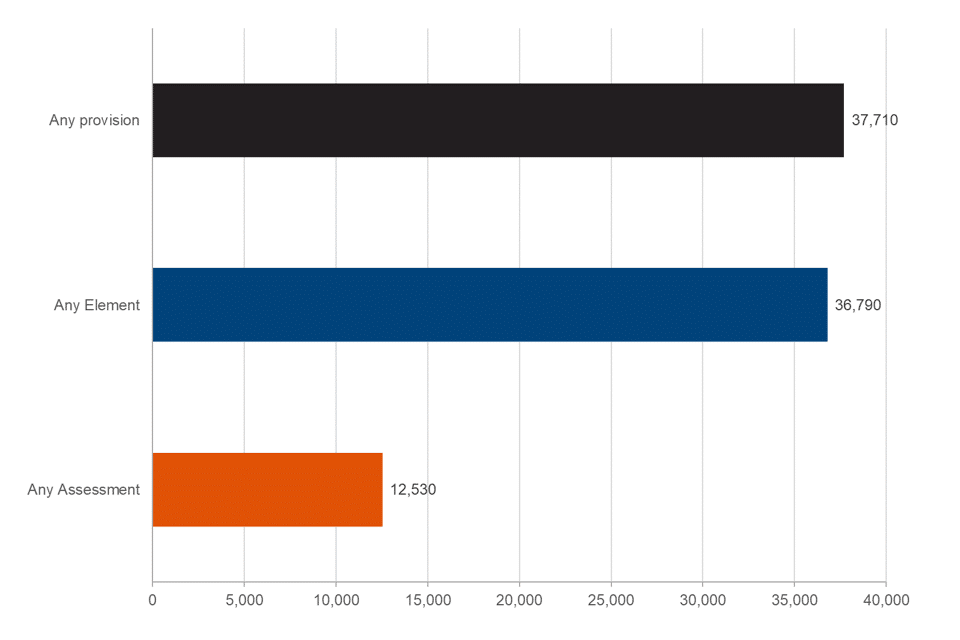Workplace leaders in Equality, Diversity and Inclusion have a specific role to play in company settings. But they also need to be aware of how workplace cultures impact the many protected characteristics.
The government’s Access to Work Scheme (AtW) is an important way to improve workplace performance for staff with disabilities, staff who are neurodivergent, or have physical and mental health conditions. But navigating the scheme can be complex. You or your staff may need help understanding the available support or further information. To help you answer some questions and leverage funding, we’ll cover some interesting facts about the Access to Work scheme in this article.
The Access to Work Scheme Helps Around 40,000 People Each Year
In 2021/22, statistics showed how 37,710 people gained funding through the Access to Work scheme. The vast majority received Element support, where the scheme provided a grant to support their individual needs as opposed to any broader workplace adjustments.
In contrast to the 4.4 million people with disabilities in paid employment, this is a minuscule amount. And there isn’t much in the way to prevent an individual from accessing funding if they’re in work, aged 16 or over, and identify as having a disability under the Equality Act 2010.
Number of people who had any Access to Work provision of each type approved in 2020 to 2021

The Access to Work Scheme is Underused
In a survey and report carried out by The Work Foundation at Lancaster University, funded by The City Bridge Trust, only 48 of 406 surveyed disabled workers said they’d used the Government’s Access to Work scheme for support. Of those who did, over 70% said they had a positive experience of the programme.
SMEs with less than 50 Employees Get Free Support
The Access to Work scheme provides funding based on the size of organisation. And the good news is that Small-to-Medium Enterprises won’t need to contribute anything for eligible staff. Access to Work will usually meet all the costs of any adaptations, equipment, or training for small businesses with less than 50 employees.

There’s an Access to Work Helpline
For anyone who can’t make their application online or has questions about the scheme, Access to Work offer a helpline service. Lines open from 9am to 5pm, Monday to Friday, while applicants who cannot hear or speak on the phone have options to textphone or call Relay UK. BSL also provides a video relay service.
- Telephone: 0800 121 7479
- Textphone: 0800 121 7579
- Relay UK: 18001 then 0800 121 7479
- British Sign Language (BSL): video relay service
Eligible Employees Don’t Need a Medical Diagnosis
The good news is that employees don’t need a medical diagnosis to access the scheme. Unless it’s needed for travel support or a support worker driver, providing medical evidence of a disability isn’t needed.
Instead, employees should disclose their condition to their employers. They’ll need to explain how it affects their ability to do their job. And for some people, disclosure can be daunting. They may fear judgement, discrimination, or changed behaviour from colleagues. To help you support staff to come forward, the video below explains the process and a range of resources.
Grants Cover A Broad Range of Support
Access to Work is perfect for helping neurodivergent staff with conditions like ADHD or dyslexia gain access to Caption.Ed. But along with funding assistive technology tools, the Access to Work scheme can fund one-to-one support such as professional job coaches, BSL interpreters, and lip-speakers.
They can also provide funding for vehicle purchases and travel costs for any staff who can’t access their workplace using public transport.
Approval Can Take up to Three Months
According to disability charity Scope, assessments may take up to 12 weeks for those already at work. Individuals who plan to start work within 4 weeks will get priority. And anyone who hasn’t received an acknowledgment for their application within 7 days should consider contacting the Helpline.
EU-Based Company Staff are Eligible if They Work in Great Britain
Access to Work is available to residents of Great Britain. Eligible individuals living in England, Scotland, and Wales can apply. Northern Ireland runs its own Access to Work scheme.
The Access to Work grant is also open to any companies based in EU countries that send their staff to Great Britain. Staff based in non-EU countries will need to show details of their visas. Otherwise, they can use a work permit or leave-to-remain status. Staff with jobs in Great Britain, who need to travel outside of the country, may get support but on a limited basis.
Access to Work Supports Internships and Traineeships
The scheme also offers eligibility to interns, trainees, and even work experience. In particular, young people who start work placements as part of the Department for Education-supported internship programme or a BIS traineeship can apply. Note: eligibility only applies to the duration of their work placement.
The great thing about gaining support at this early stage is that Access to Work will go on to fund any extra travel, coaching, or equipment costs as young people transition to paid employment.
Caption.Ed’s Assistive Technology Consultants Can Help to Access Funding
We hope you’ve gained some broader insight into the benefits of the government’s Access to Work scheme. But if its raised further questions, we encourage you to contact our helpful Assistive Technology Consultants for more information.
Our team is on hand to answer any questions or difficulties you have understanding your eligibility for the Access to Work scheme. Our consultants also have extensive expertise in the different ways Caption.Ed can improve workplace outcomes for staff with disabilities, neurodivergence, or physical and mental health conditions.


